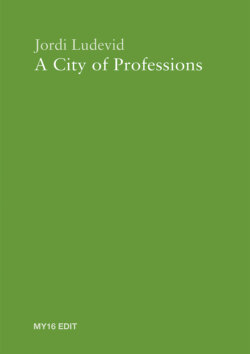Читать книгу A City of Professions - Jordi Ludevid Anglada - Страница 15
На сайте Литреса книга снята с продажи.
ОглавлениеIII. The Sallent dump
The landscape of salt mining, of industry, the 20th century,
the valley ends, the plain begins... A crossroads.
III. A Long History
The poet expressed it in a single verse: «He who loses his origins, loses his identity». Indeed, in order to understand the professional phenomenon and to engage in a reflection based on a relatively solid foundation, we need to situate the professions in their historical context, to understand their past and their evolution in order to assess and analyse them before interpreting their future. Where do we come from? What is the professional phenomenon and what has it been historically? What is its legal and conceptual nature?
We have come to call thoughtful remembrance historical memory or collective memory. Knowing the past empowers us. In today’s world, recovering our memory, and with it the meaning of the professions, is a potentially enlightening exercise for everyone, and in a special sense for cities too. Although it is little known or has been forgotten, the professional fact was born in cities, in the Greco-Roman polis, and to support them – a public connection which continued up until the 19th century.
Curiously, and all too often, we have taken on responsibilities in institutions or associations with a certain historical and conceptual ignorance of the essence of what we were dealing with. This has undoubtedly weakened our leadership performance. However, we can make up for this lack, brought about by the absence of an updated and contemporary historical narrative, by investigating a reality that often is not what it seems or what people say about it. We need to disseminate a contemporary narrative on a regular basis, perhaps in a regulated manner. As things stand, failing to recover our historical memory is tantamount to denying it. For, indeed, «he who loses his origins, loses his identity».
More than 100 years have passed since the sociologist Max Weber wrote his well-known theses on professionals in 1905: The Protestant Ethic and the Spirit of Capitalism.12 Since then, the world has changed a lot, it goes without saying. So, too, have the professions, of course, although that may not always seem to be the case due to the prevalence, in certain fields, of some poorly understood, vaguely «Weberian», theses. A profession is more than just a way of earning a living.
The following brief historical journey takes us from Hippocrates to Cicero and from Cicero to Max Weber, through the Middle Ages and the Napoleonic university to the present-day network society. In other words, from Greece to Rome, from Rome to the Middle Ages and from the Middle Ages to the Protestant Reformation, the nation state and industrialisation. And through outsourcing and digitalisation to the present day.
12 Max Weber, The Protestant Ethic and the Spirit of Capitalism (Penguin, 2002), first published in 1905.
